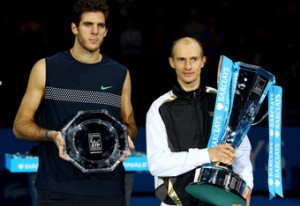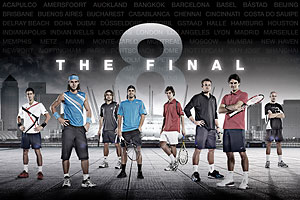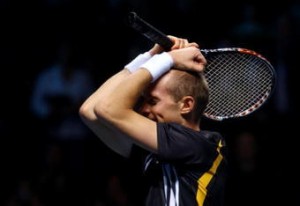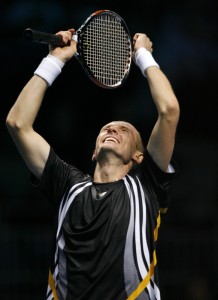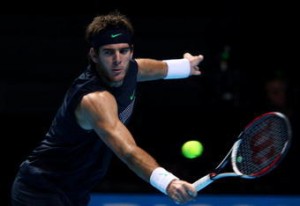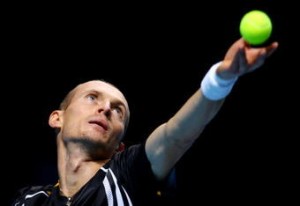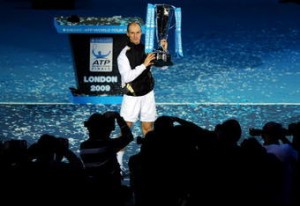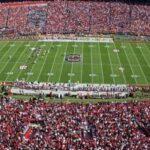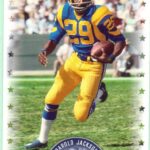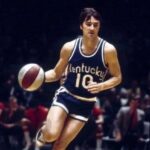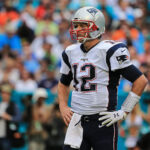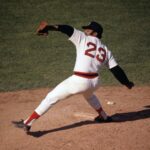Classic Match: Nikolay Davydenko Vs. Juan Martin del Potro at 2009 WTF in London
It’s London 2009, in the gloomy chill of November, and the British are about to see tennis in a whole new light.
Since O2 had transformed the Millennium’s ugly duckling dome that squatted alongside the Thames into a swan, it had become the place to perform: for Prince and Springsteen, for Kylie and Led Zeppelin, and for Rafa and Roger.
Because 2009 had marked the transfer of the Masters Cup from Shanghai to the newly-titled World Tour Finals in the original capital of tennis: London.
But this was a far cry from Wimbledon. This was modern cityscape replete with light show, soundtrack and glamour, determined to bring the best of Shanghai to London’s unlovely Docklands.
As if to celebrate the occasion, the end-of-year climax had secured the top eight men in tennis for the first time in years. The finale in Shanghai was missing Rafael Nadal, injured before it began. It lost Andy Roddick, injured in practice and replaced by Radek Stepanek at the last minute.
And Roger Federer was only there by the skin of his teeth, having pulled out of Paris, mid-tournament, two weeks before with a back injury. In the event, he barely made it through the round robins, so debilitated had he become.
But London welcomed the crème-de-la-crème. Even a limping Andy Roddick, who was replaced at the last moment by Robin Soderling, turned up to watch. And the tennis-mad home crowd quickly adjusted from English to British and embraced Andy Murray as one of their own.
The dome, then, was packed to the rafters for eight solid days of superstar tennis: not just Murray and Soderling but Federer, Nadal, Fernando Verdasco and Novak Djokovic. On top of that, there was the newest Slam winner, Juan Martin Del Potro.
And then there was the eighth…
Nikolay Davydenko is not a man who seeks the limelight. He shuns the attractions of Monaco and Miami for his home town of Volgograd, where he has lived since the age of 11.
Surrounded as he has always been by taller, more imposing men—the towering hardwoods of the tennis landscape—it has been easy to overlook his enviable record in the men’s rankings.
This slight, angular, blond figure has won an ATP title every year since 2003 and been in the top 20 since early 2005.
A pale silver birch of a man, who stands apart in a forest of golden oak and beech, Davydenko had been was one of the form players at the tail end of 2009. He had taken out Gael Monfils, Soderling and Verdasco on his way to the Kuala Lumpur title, and then the scalps of both Nadal and Djokovic in winning the Shanghai Masters.
He was the only man that year to win more than 25 matches on both hard and clay courts, and concluded his most successful year of titles since 2006.
It’s easy to forget just what scintillating tennis he can produce, and many spectators in London had done just that. But Davydenko’s flat, penetrating, technically-efficient ground strokes open up the court with surgical precision, and are followed by killer shots down the line or cross-court. Both sides are equally deadly. The effect of his movement is of birch leaves in the breeze, never still, like quicksilver.
This was the Davydenko who reached the final of the Masters Cup in 2008 and this was the Davydenko who showed up in London 2009.
First in his pool was Djokovic, also in hot form, but in every other way a complete contrast: popular, swaggering, clad in hot red shirt and dazzling red shoes. Davydenko arrived in his characteristic pale, ill-fitting kit to muted applause.
Their match was a repeat of the 2008 Shanghai final, and it showed. Both fired on all cylinders: fast, energetic, top-notch tennis. They hurtled from side to side, hitting and retrieving bullet-fast shots from each other.
The momentum shifted between the first and second sets, then again halfway through the third set, building up the tension and the crowd’s support. And as in 2008, Djokovic got the win, just, in two-and-three-quarter hours of stunning tennis.
Next, the flickering Russian took on and beat Nadal in straight sets. The crowd started to take notice, especially when he also felled the big Swede Soderling—six inches taller and 15 kilos heavier—in just over two hours.
Then it was a semi-final against the man to whom he had lost in all their 12 meetings, Federer. But as he later asserted, “No one beats me 13 times!”
It took him almost two hours and three sets, and it demanded the highest quality tennis of the tournament, but Davydenko made it lucky 13. His reward was a final against the biggest tree in the forest: the mighty giant sequoia that is Del Potro.
The newest name on the Grand Slam role of honor came to London in poor shape. After his U.S. Open victory, Del Potro had failed to win a match in the Asian swing, retiring injured in Shanghai. He pulled out of Basel, and then retired with an abdomen strain in the quarterfinals of the Paris Masters.
So the tall, burnished redwood of a man came to London apparently struggling to manage the pressure of his Slam status and recovering from injury. He made a cold, awkward start against Murray and then contended with a nosebleed part way into the match. However, he began to show signs that his trademark flat forehand was returning.
Sure enough, he went on to beat Verdasco and then Federer, each round robin match going to three sets. In the semis too, a slug-fest between the two big men of the tournament, Del Potro axed his way through Soderling in more than two hours, three sets and two tie-breakers to reach the finals.
So the diminutive Russian faced the imposing 6’6″ Argentine, but their appearances belied the direction the wind would blow. Who could have anticipated they would hit an equal number of aces, or that the Russian would hit a greater percentage of winning points on both his first and second serve?
Who would believe that, by the sixth game in the second set, Davydenko would have lost only three points when his first serve was good? Nor that he could, at break-point down in that game, save the first point with an ace and the second with a serve and volley?
Davydenko flashed and flickered, unleashing ground strokes so crisp that they sounded like hammer blows. He attacked every ball on the rise and returned a slow-motion Del Potro’s forehands with interest. Receiving at 4-4, the Russian took barely two minutes to fire off four rallies of perfect strikes to break to love.
As the lights dropped to midnight blue, Davydenko ambled to the baseline to serve out for the biggest title of his long career, and did so with ease. World Tour Champion, 6-3, 6-4.
His press conference after winning the trophy was revealing of his wistful desire for a little of the adulation accorded to his fellow players. “Everybody knows [Federer]. But, maybe now, after London, I also have a little bit, just a small part of famous here in London. I would like.”
As if his tennis was not enough to win over London, his dry wit and modesty certainly did, and the city looked forward to his title defence this year. But it was not to be. 2010 has blighted both Davydenko and Del Potro like an unwelcome frost.
The Russian began the year with the Doha title and, just as he’d done before Christmas, he beat both Federer and Nadal.
He reached the Rotterdam semi-finals where he unknowingly fractured his left wrist during a fall. Little wonder, then, that he retired in Dubai and pulled out of Indian Wells, where an MRI scan revealed the seriousness of the problem.
He returned at Halle in early June, but in only four tournaments out of 16 since has he managed to win more than one match. In none has he won more than two.
Davydenko has just dropped 11 ranking places in a single week, and has fallen from No. 6 just a month ago to No. 22. It’s the first time he’s been out of the top 20 in almost six years and the first time since 2004 that he will not be playing the end-of-year championships.
The disappointment of failing to see him defend his biggest title is compounded by the loss of a style of tennis that is always exciting, always fast and often breathtaking.
Davydenko’s absence is further compounded by the absence of his fellow 2009 finalist. Del Potro opened 2010 in the top four for the first time in his career, and he closes it in the wasteland of the rankings, at 259. In between, it has been a story of injury not unlike Davydenko’s.
The Argentine’s season ended, after four gruelling matches at the Australian Open, due to a chronic wrist injury, and he eventually succumbed to surgery in the spring. He failed to play again until the end of September, lost in the first round in both Bangkok and Tokyo, and promptly called it a day for the rest of the season.
The young Del Potro is scheduled to play in Sydney in January. For the moment, Davydenko has, entirely in character, disappeared without a word.
Neither man revels in their tennis stardom, neither even has their own website. But both have tennis that belongs on the courts of the O2.
From whatever undisclosed locations they watch this year’s drama unfold and their trophies reallocated, they will surely be plotting their return.
